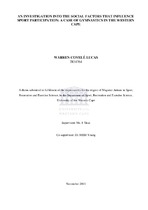An investigation into the social factors that influence sport participation : a case of gymnastics in the Western Cape
Abstract
Gymnastics is a sport code that develops basic motor skills, hand-eye coordination and provides participants with an opportunity to socialize and learn new skills. There are various social factors, such as a family’s socioeconomic status or accessibility to sports facilities that may play a role in affecting levels of participation. The aim of this study is to investigate the social factors that have an influence on gymnastics participation in the Western Cape. To this end, a qualitative approach is adopted to collect data. This study also adopts the ecological systems theory (Bronfenbrenner, 1995) as the theoretical framework, and is used to analyse and interpret current social factors that directly or indirectly influence participation in gymnastics. The study’s objectives were to ascertain which social factors hinder participation, and which social factors promote participation, thus, coaches, parents and gymnasts participated in focus group discussions. Key informant interviews took place with experts in the field of gymnastics in the
Western Cape. A thematic analysis was conducted on transcriptions from the focus group discussions and key informant interviews. Social factors investigated in this study occurred in the chronosystem, macrosystem, exosystem, mesosystem, and microsystem, and had both a direct and indirect influence on the gymnast’s continued participation. These systems are defined by Bronfenbrenner (1995), as the environment of the individual, in which they grow and develop. The research findings of this thesis are used to draw conclusions and make specific recommendations for practice and further research. The information gathered in this study can assist all stakeholders within the field of gymnastics, such as parents, judges, coaches, gymnasts, and the supporting community which surround the participating gymnast.

